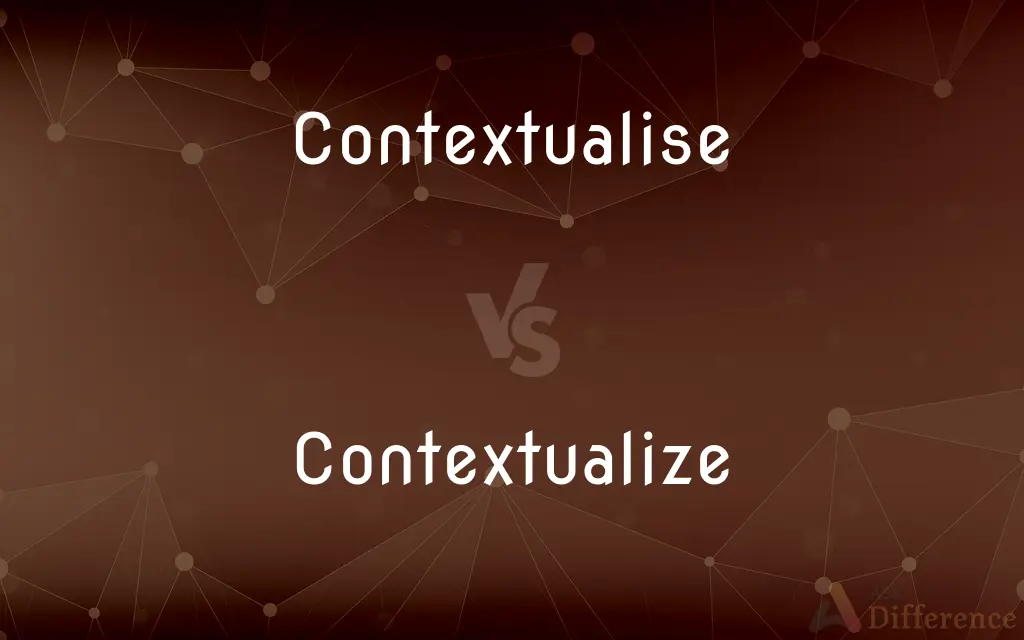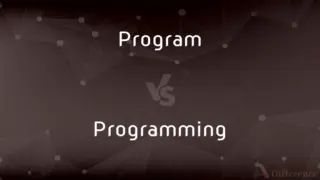Contextualise vs. Contextualize — What's the Difference?
Edited by Tayyaba Rehman — By Urooj Arif — Updated on April 1, 2024
"Contextualise" is the British English spelling, focusing on placing events or information within a broader context, while "contextualize" is its American English counterpart, with the same meaning.

Difference Between Contextualise and Contextualize
Table of Contents
ADVERTISEMENT
Key Differences
"Contextualise" and "contextualize" refer to the process of considering or placing something within its wider context to understand its significance, meaning, or relationships with other factors. The primary difference between the two lies in regional spelling preferences, with "contextualise" being used in British English and "contextualize" in American English. This distinction mirrors the broader pattern of spelling variations between British and American English, such as "organise" vs. "organize" or "realise" vs. "realize."
Both terms are used in academic, professional, and everyday settings to describe the act of analyzing something within its surrounding circumstances, background, or environment. This can apply to a wide range of subjects, including historical events, literary works, cultural practices, and more, highlighting the importance of context in understanding and interpretation.
The choice between "contextualise" and "contextualize" often depends on the intended audience or the regional standards of the publication or institution involved. It's crucial for writers and speakers to be aware of their audience's expectations and to choose the variant that aligns with the preferred spelling conventions of that audience.
Despite the spelling difference, the pronunciation of "contextualise" and "contextualize" is virtually identical, making this distinction primarily a concern in written communication. In both cases, the emphasis is on understanding the broader implications, nuances, and background of the subject matter, reflecting a comprehensive approach to analysis and interpretation.
Regardless of spelling, the concept of contextualizing information is fundamental across disciplines, emphasizing the need to consider the broader framework within which something exists or occurs. This approach enriches the analysis and enhances the understanding of complex issues by acknowledging the influence of external factors and the interconnectedness of events and ideas.
ADVERTISEMENT
Comparison Chart
Spelling Region
British English
American English
Definition
Placing events or information in context
Placing events or information in context
Usage Context
Academic, professional, everyday language
Academic, professional, everyday language
Pronunciation
Virtually identical to "contextualize"
Virtually identical to "contextualise"
Considerations for Use
Preferred in British English-speaking regions
Preferred in American English-speaking regions
Compare with Definitions
Contextualise
Emphasizes the importance of background and circumstances in analysis.
To fully contextualise the novel, the critic examined the socio-political climate of the era.
Contextualize
Analyzing or understanding something within its wider context.
Teachers encourage students to contextualize historical documents by considering the author's perspective and time period.
Contextualise
Analyzing or understanding something within its wider context.
Scholars often contextualise historical events to understand their causes and impacts better.
Contextualize
Used in American English.
American journalists often contextualize current events within broader social and political trends.
Contextualise
Crucial for deep understanding and interpretation.
Contextualising scientific discoveries can reveal the influence of societal needs and technological advancements.
Contextualize
Applicable across various disciplines.
Psychologists contextualize individual behavior within environmental and genetic factors.
Contextualise
Used in British English.
In British academia, the term contextualise is commonly used to describe the process of placing literary works within their historical and cultural backgrounds.
Contextualize
Emphasizes the importance of background and circumstances in analysis.
To contextualize the artist's work, the curator explored influences from earlier movements.
Contextualise
Applicable across various disciplines.
Anthropologists contextualise cultural practices to understand their significance within a society.
Contextualize
Crucial for deep understanding and interpretation.
Contextualizing economic policies can help explain their successes or failures in different regions.
Contextualise
(British spelling) contextualize
Contextualize
Place or study in context
The excellent introduction summarizes and contextualizes Bowen's career
Contextualize
To place (a word or idea, for example) in a particular context.
Contextualize
To place something or someone in a particular context.
Common Curiosities
What does "contextualise" mean?
"Contextualise" means to place information or events within their broader context to understand their significance or relationships.
Can "contextualise" and "contextualize" be used interchangeably?
In writing, it's best to stick to one spelling variant for consistency. However, the choice won’t affect understanding due to their identical meanings.
Why is it important to contextualize information?
Contextualizing information is crucial for a deeper understanding, allowing for a more comprehensive analysis by considering the broader circumstances or influences.
How do I know whether to use "contextualise" or "contextualize"?
Choose based on your audience or the regional English spelling conventions you are following; "contextualise" for British English and "contextualize" for American English.
Do "contextualise" and "contextualize" have the same pronunciation?
Yes, both words are pronounced in the same way, making the distinction primarily a matter of orthography.
Is there a difference in meaning between "contextualise" and "contextualize"?
No, the difference between "contextualise" and "contextualize" is purely spelling; they share the same meaning.
Is the concept of contextualization only applicable to humanities?
No, contextualization is a valuable approach in sciences and other fields as well, helping to place discoveries, behaviors, or phenomena within a broader explanatory framework.
Are there contexts where one variant is preferred over the other?
Yes, the preference often aligns with regional spelling standards, with "contextualise" preferred in British English contexts and "contextualize" in American English contexts.
How can I improve my ability to contextualize information?
Improving contextualization skills involves broadening your knowledge of historical, cultural, and social backgrounds and actively considering these contexts when analyzing information or events.
How does contextualizing help in academic studies?
In academic studies, contextualizing helps students and scholars understand the deeper implications, connections, and influences of the subject matter.
Share Your Discovery

Previous Comparison
Program vs. Programming
Next Comparison
Detective vs. SpyAuthor Spotlight
Written by
Urooj ArifUrooj is a skilled content writer at Ask Difference, known for her exceptional ability to simplify complex topics into engaging and informative content. With a passion for research and a flair for clear, concise writing, she consistently delivers articles that resonate with our diverse audience.
Edited by
Tayyaba RehmanTayyaba Rehman is a distinguished writer, currently serving as a primary contributor to askdifference.com. As a researcher in semantics and etymology, Tayyaba's passion for the complexity of languages and their distinctions has found a perfect home on the platform. Tayyaba delves into the intricacies of language, distinguishing between commonly confused words and phrases, thereby providing clarity for readers worldwide.
















































